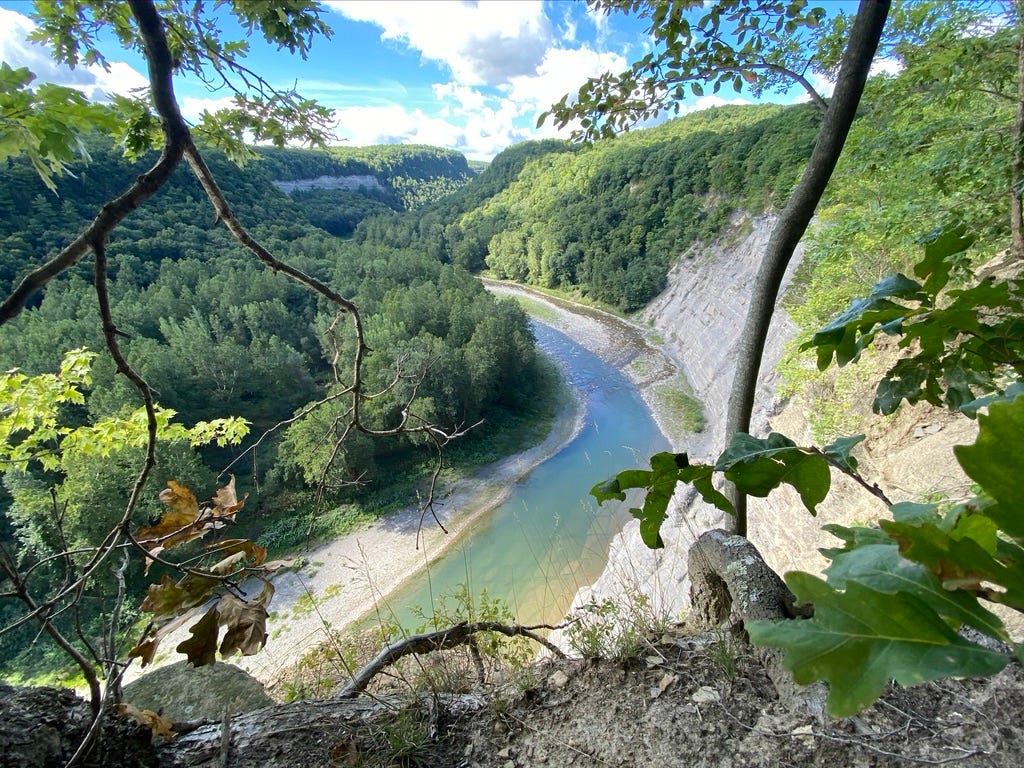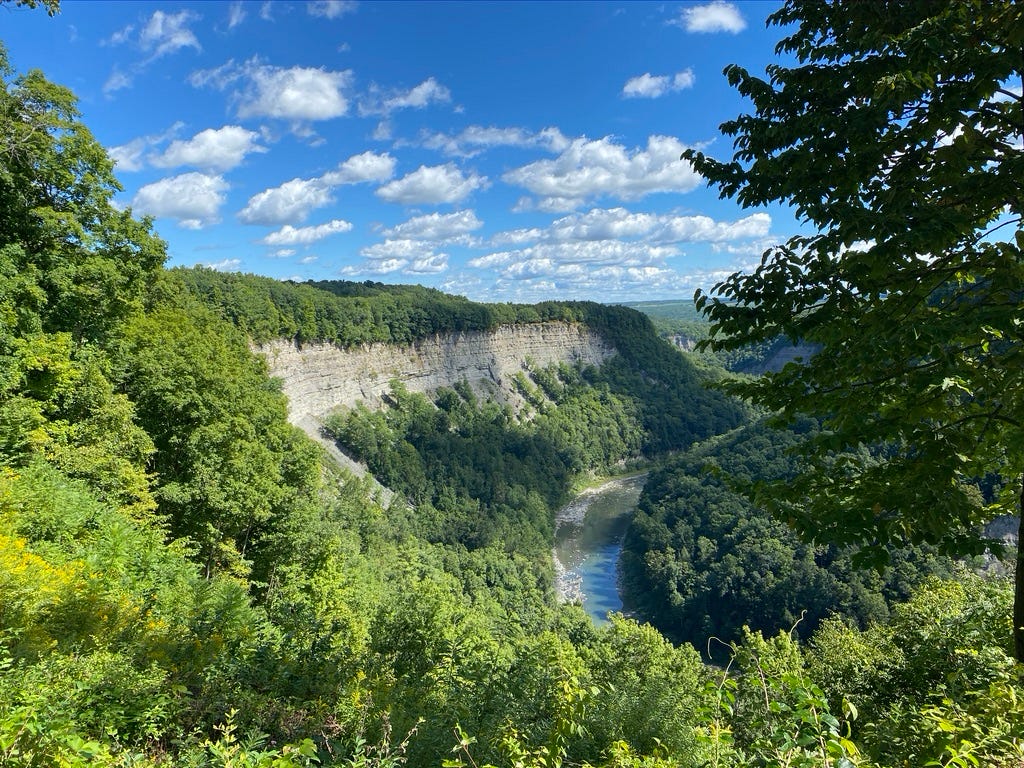I Think About The Need For A Tree Army
All that was made can be unmade, and we have to hope the reverse is also true

Last Friday I drove a few hours out to Western New York to meet up with a childhood friend for a hike. We headed to Letchworth State Park, which I found out in writing this is affectionately called “The Grand Canyon of the East,” due partly to what the Genessee River Gorge looks like and partly because people who have never been out West struggle to comprehend the scale of things out on the left half of the country.
We stood at the edge of the gorge and watched as the turkey vultures floated in perfect circles high above us. Below the river ran wide and steady, a blue-green ribbon carrying silt from above the falls to some place far distant. The quiet forest trail touched the rim every few hundred yards; in between, we were carried through stands of oak and birch and countless others, crunching small green acorns underfoot, talking about the uses of the plants we saw—the common plantain, for instance, can be chewed into a paste that takes the itch and swelling out of mosquito bites. The bounty of nature and the amount of trial and error and daring it took however many thousands of years ago to gain even this tiny piece of knowledge boggles the mind. How many others were tasted, tried, abandoned? How many others were the singular cause of a family’s unending grief? The scope of the sacrifice—incomprehensible.
Maybe it’s this more than anything that gives me hope about the future. That there’s some deep immortal spark within us determined to survive, persevere, find a way, even when sacrifice is demanded.

Luckily there are plenty of examples of lifelong dedication to massive socially-oriented projects to look up to, even in that small world of hiking. Dissent recently published a piece called “The Long Trail to Socialism,” outlining the decades-long fight to build the infrastructure of America’s three long thru-hikes—The Appalachian, Pacific Crest, and Continental Divide Trails. I’m generally wary of the well-intentioned thesis that “socialism is just when the government does stuff,” claiming everything from the post office to the fire department as socialist projects, but in this case, the author Kevin Mattson makes a compelling case that these particular endeavors fit the bill because building the trails was done in the public interest, (mostly) on public land, devoid of profit-making enterprise and geared solely toward recreation—the radical idea that our lives can and should have more in them than working for a wage and spending money. (I wrote a piece in this vein back in 2017 for The Trek. Mattson shares an anecdote about meeting a European hiker who got to take a few months off work to go thru-hike with the guarantee that his job would be waiting for him when he got back. A similar series of encounters with Europeans and South Koreans was what sparked my essay, too.)
Mattson doesn’t just describe things as they are, either, instead outlining a vision for what can and should be.
The history of these trails should remind us of a vision based on public ownership, wilderness protection, the right to recreation, and the necessity of planning in order to combat sprawl. We should think of these long trails with wilderness areas as akin to Medicare and Medicaid or Social Security: public goods for all, not for you and me but us. I imagine some of those I chatted with while traveling national trails would be the first to recognize this.
…I keep thinking about the politics of thru-hiking. I think about long vacations and how much leisure can help alleviate the stress of the economic scramble, and I wish Americans had a right to a vacation. As I watch unemployment rates skyrocket at the time of this writing, I think about the idea of a Tree Army—and the concept of public works more broadly—that might resonate now, the way it did during the Great Depression. A huge expansion of AmeriCorps could repair trails built by earlier CCC troops. As oil consumption plummets—one of the few benefits of our bleak times—leisure looks better for the environment, maybe even slowing down global warming. And as we suffer a presidency both impulsive and erratic, MacKaye’s idea of planning responsibly—with its ethic of thinking about the future more consciously—looks a lot more appealing than before.
Having been back on the west coast for a few days this set of ideas seems more appealing—and more necessary—than ever, as wildfire smoke fills the air in what has become an annual ritual. There are fundamental environmental transformations at work here, and while the easy answer of “climate change” is certainly true, we also need to consider the scope of the engineering that made it possible for that climate change to do its terrible work.


I had perhaps foolishly always assumed that California’s vast ecological diversity, ranging from Redwood forest to Death Valley desert, was basically a product of its size and the wondrous diversity of the American continent itself. Maybe with a little human intervention thrown in. What is instead true is that vast swaths of this abundantly green state were drained dry and turned brown by damming and diverting its many waterways to meet the needs of industrial agriculture and the booming populations of improbably desert cities like Los Angeles. The aftermath, the dry aridity and the loss of native plant life, not to mention the larger industrial capitalist project that has quite possibly doomed the world, makes for a whole state that can be set ablaze by something as small and pathetically stupid as a gender reveal party firework.
Getting out from underneath any of this catastrophe will require thinking bigger and more creatively than simply voting out the current president. And while it’s not an exercise in building power necessarily I have to think some part of it must come from recalibrating the way we view the world—the parts of it that have been made and unmade, the need for an ethos that values human flourishing over profit, and the commitments we must have to the living over all the things that were never alive.
It’s a grim thing we’re facing, to be sure. But I think it contains within it that which we need to win.
Talk to you next week.
-Chuck
PS: Speaking of all this hiking, Sunday marked the 4-year anniversary of me completing my Pacific Crest Trail thru-hike. To celebrate, the paperback and Kindle editions of my PCT book, A Good Place For Maniacs, are 25% off this week.



